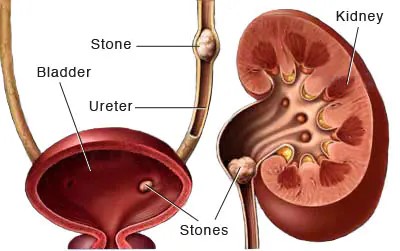
Kidney Stones: Causes, Symptoms, Prevention, and Treatment
Introduction
Kidney stones are small, hard deposits that form in the kidneys due to the crystallization of minerals and salts. They can cause severe pain and discomfort, making daily activities challenging. While kidney stones are common, understanding their causes, symptoms, and preventive measures can help you avoid the agony they bring. This blog explores everything you need to know about kidney stones, from their formation to effective treatment options.
Kidney stones, medically known as nephrolithiasis or urolithiasis, are solid masses formed from substances that crystallize in the urine. These stones can vary in size, ranging from a grain of sand to as large as a golf ball. They may remain in the kidney or travel through the urinary tract, causing excruciating pain if they block the flow of urine.
Causes of Kidney Stones
Kidney stones develop due to several factors, including:
- Dehydration – Inadequate water intake leads to concentrated urine, increasing the chances of stone formation.
- Dietary Habits – Excessive consumption of oxalate-rich foods (spinach, nuts, chocolate), high-sodium diets, and animal proteins can contribute to kidney stones.
- Genetics – A family history of kidney stones increases the risk of developing them.
- Medical Conditions – Conditions like hyperparathyroidism, obesity, urinary tract infections, and gastrointestinal diseases can lead to stone formation.
- Medications – Certain medications, such as diuretics, antacids, and calcium-based supplements, can increase the risk of stone formation.
The symptoms of kidney stones vary based on the size and location of the stone. Common symptoms include:
- Severe pain in the back, side, lower abdomen, or groin
- Painful urination with burning sensation
- Blood in urine (pink, red, or brown urine)
- Frequent urge to urinate
- Nausea and vomiting
- Fever and chills (if an infection is present)
- Cloudy or foul-smelling urine
Types of Kidney Stones
Kidney stones come in different types, each with unique causes:
- Calcium Stones – The most common type, formed from calcium oxalate or calcium phosphate.
- Uric Acid Stones – Formed due to high levels of uric acid, often linked to diets high in purines (red meat, shellfish).
- Struvite Stones – Typically caused by urinary tract infections and grow rapidly.
- Cystine Stones – Rare, caused by a genetic disorder leading to excessive cystine in urine.
Prevention of Kidney Stones
While kidney stones can be painful, they are preventable with simple lifestyle changes:
- Stay Hydrated – Drink at least 2-3 liters of water daily to keep urine diluted.
- Balanced Diet – Reduce intake of oxalate-rich foods, excess salt, and animal protein.
- Limit Sugary Drinks – Avoid soda and processed juices that may increase the risk of stone formation.
- Maintain a Healthy Weight – Obesity is a risk factor for kidney stones.
- Regular Exercise – Staying active helps prevent conditions that lead to stone formation.
- Monitor Calcium Intake – Get calcium from dietary sources rather than supplements.
Diagnosis and Treatment
If you suspect kidney stones, consult a doctor for proper diagnosis. Common diagnostic tests include:
- Urinalysis – To detect blood, crystals, and infections in the urine.
- Imaging Tests – X-rays, ultrasounds, or CT scans help identify the size and location of stones.
- Blood Tests – To check calcium, uric acid, and other levels contributing to stone formation.
Treatment Options
The treatment for kidney stones depends on their size and severity:
- Small Stones – Often pass naturally with increased water intake and pain management.
- Medications – Alpha-blockers help relax the ureter, allowing stones to pass easily.
- Extracorporeal Shock Wave Lithotripsy (ESWL) – Uses sound waves to break stones into smaller fragments for easier passage.
- Ureteroscopy – A thin tube inserted into the urethra to remove or break up stones.
- Percutaneous Nephrolithotomy (PCNL) – A minimally invasive surgical procedure for large stones.
- Open Surgery – Rarely needed, used only for extremely large or complex stones.
When to Seek Medical Attention
Seek immediate medical help if you experience:
- Severe pain that doesn’t subside
- Blood in urine
- Persistent nausea and vomiting
- Fever and chills
- Difficulty urinating
Conclusion
Kidney stones are painful but manageable with the right knowledge and lifestyle changes. Staying hydrated, maintaining a healthy diet, and seeking timely medical advice can prevent and treat kidney stones effectively. If you experience symptoms, consult a doctor to determine the best course of action. By taking proactive steps, you can reduce the risk of kidney stones and maintain a healthy urinary system.



